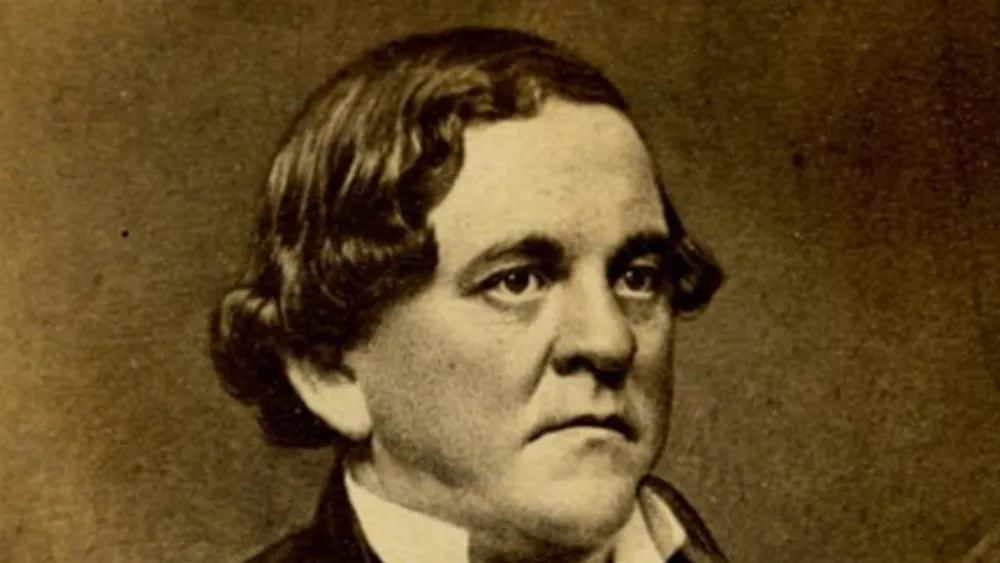Howell Cobb immersed himself in the rural culture that would profoundly influence his worldview.
Growing up in a society deeply rooted in agricultural practices, Cobb gained firsthand understanding. He became familiar with the economic and social dynamics that shaped the Southern states.
His educational journey at the University of Georgia honed his intellectual capabilities and instilled in him a sense of civic duty. This commitment to public service became evident when he took on his political career. Moreover, he represented Georgia in the state legislature before ascending to the national stage in the U.S. House of Representatives.
As a skilled lawyer, Cobb’s legal acumen was a cornerstone of his success in political and military arenas. His comprehensive understanding of the law equipped him with the tools to navigate the intricate issues that defined his era, from debates over states’ rights to the legal complexities surrounding slavery.
Cultivating Intellectual and Political Foundations
Howell Cobb’s early years unfolded during a time of significant change in the United States. Wrestling with questions of identity and unity was a common theme in his formative experiences. Growing up in the rural South provided Cobb with a unique perspective on the nation’s emerging complexities. Cobb was surrounded by large plantations. Furthermore, he had strong family ties to the land and navigated the complex connection between agriculture and the economy. So, it shaped his worldview.
Academic Journey and Legal Odyssey
As he pursued education at the University of Georgia, Cobb found himself immersed in an intellectual environment that exposed him to diverse perspectives. This period nurtured the seeds of his budding political consciousness, laying the foundation for his future endeavors.
The values instilled during his university years became evident in Cobb’s commitment to public service. As he ventured into the study of law and was admitted to the bar in 1836, he embarked on a legal journey that not only defined his professional life but also equipped him with the necessary tools to navigate the complex legal landscape of the antebellum era. Cobb’s multifaceted career was set in motion, influenced by his upbringing, education, and a deep sense of responsibility to reconcile the diverse interests of a rapidly expanding nation.
Howell Cobb: The Political Landscape of the Mid-19th Century
The meteoric rise of Howell Cobb in the political arena mirrored the dynamic nature of the times. His entry into the Georgia House of Representatives in 1843 marked the commencement of a career that would soon transcend state boundaries. Swiftly gaining prominence, Cobb’s political trajectory propelled him to the U.S. House of Representatives within a few short years.
This ascent to national politics occurred against a nation in flux. The mid-19th century witnessed a vigorous debate over issues that would come to define the era—states’ rights. Some of these are the expansion of slavery and the relentless push westward. Cobb’s rapid political ascent was a personal achievement. Moreover, it reflects his keen understanding of the prevailing political climate.
Cobb’s alignment with the Democratic Party, particularly its Southern faction, cemented his position as a formidable force in the political landscape. His advocacy for states’ rights became a central tenet of his political ideology. Furthermore, he tirelessly championed the cause of the rural South. As a representative, Cobb became the voice of a region deeply intertwined with agriculture, economics, and the institution of slavery.
Struggle for Union amidst Sectional Tensions
In 1849, Howell Cobb’s political ascent reached new heights as he assumed the prestigious role of Speaker of the House, a position that underscored not only his political acumen but also his remarkable leadership skills. His appointment at such a young age marked a testament to his rising influence within the political landscape.
As Speaker, Cobb found himself at the epicenter of the increasingly contentious debates that roiled the nation, particularly concerning the extension of slavery into newly acquired territories. The delicate balance he sought to maintain between the interests of the North and the South reflected the fragility of the Union itself. Cobb’s role as Speaker became pivotal in mediating the growing tensions that would eventually erupt into the secession crisis and the Civil War.
A nuanced approach to the pressing issues of the time marked his tenure in this influential position. Cobb’s efforts to navigate the intricacies of the slavery debate demonstrated not only his political skill. It is also a genuine attempt to preserve the nation’s fragile unity.
Howell Cobb: Recession and Civil War
As the nation neared the brink of the Civil War, Cobb struggled with torn loyalties. He tried to balance his commitment to the South and the Union. Despite his earlier efforts to preserve the Union, Cobb ultimately chose to side with his home state of Georgia and resigned as Secretary of the Treasury in 1860.
Cobb’s commitment to the Confederate cause became evident when he accepted a commission as a colonel in the Confederate Army. His military service was marked by dedication and courage. Furthermore, he quickly rose through the ranks, eventually becoming a major general. Unfortunately, Cobb’s military career was cut short when he was mortally wounded during the Battle of Fredericksburg in 1862.

Legacy in the Context of Ideological Struggles
Howell Cobb’s legacy is like a complex story, full of his political career, support for states’ rights, and military service. Some praise him for his dedication to the South, but others criticize his role in supporting slavery. This part of history still sparks intense debates.
As a controversial figure, Cobb’s place in history is a testament to the polarizing nature of the issues he grappled with during his lifetime. His legacy encapsulates the broader struggle between conflicting ideologies that characterized the antebellum period.
Cobb’s stance as a defender of states’ rights and his allegiance to the Southern cause have earned him admiration and condemnation, depending on one’s perspective.
Howell Cobb: Struggle in the Midst of Civil Unrest
The life of Howell reflects the turbulent times that defined the mid-19th century in America. The clash of political ideologies, the intensifying debates over slavery, and the overarching question of states’ rights all converged to create an environment on the brink of a devastating conflict.
Howell Cobb’s path mirrors the internal conflicts that tore the nation apart and triggered the onset of the Civil War.










